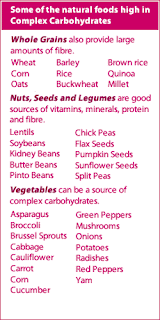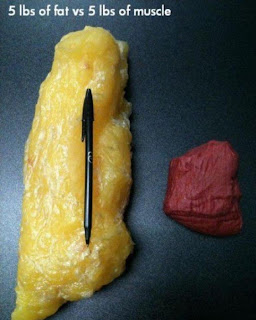.png) |
| The picture on the left is Flo's before picture, the other 2 pictures are what Flo looks like now |
I asked Flo several questions in her last session about her experience and this is what she had to say:
What results have you achieved?
Since starting training with Martin I have lost 8.5 inches, 2.6% body fat (from 29.1% to 26.5%) and 4 1/4lbs. I have also dropped from a size 14 to a size 12 and my confidence has gone through the roof.
I joined the gym in January 2012 and did the classic thing of doing really well for the initial couple of months, before dropping off a bit (ok a lot) when spring and summer came along. I managed to drop a few kilos and felt more toned than when I had started but didn't see huge results. It took one of my friends suggesting that we go along to Slimming World to realise that you couldn't half-heartedly go to the gym a few times a week and carry on eating whatever you liked if you wanted to get in shape. Having my diet in check, I started to lose weight and now wanted to get my exercise back on track as well.
When I started training with Martin, he gave me a lot of nutrition advice as well as the training. I've now got a much better understanding of the sort of food I should be eating when I'm doing a lot of exercise - to keep my energy levels up and to build up and repair lean muscle. I've stopped using the scales as the defining factor, as on paper 4lbs doesn't look like a huge loss but on the other hand, 4 inches from my waist does!
 How have you found the training plan?
How have you found the training plan? It's safe to say I found the training sessions a challenge. I had never done a hill sprint before in my life and that was what I spent my first session doing! However, when I came back the next week to do my next cardio session I could feel the improvement already. The session that was a real benchmark for me was just over half-way through the programme, when I did high-octane cardio at the quay. This involved running approximately 6 km in about 40 mins, interspersed with body weight exercises such as burpees, mountain climbers and squat jumps. I never thought I'd be able to do this!
What improvements have you noticed?
Apart from the obvious improvement in my body shape, there's a few other things I've noticed as well. I have better balance and my co-ordination has got slightly better! (I still can't tell my left and right, no matter how fit I get that is never going to change) I sleep better and feel much less groggy when I get up in the morning. I have more energy so feel more inclined to go outside on my lunch break and/or go to the gym after work.
What skills have you taken away from this experience?
I've learned a huge amount about the best ways to train when you're trying to lose weight and now use these methods when I'm in the gym or go to classes which I feel follow a similar vein (such as spinning and circuits). I also incorporate different equipment and movements into my workouts, such as kettlebells, ViPR and TRX.
I find Martin's Facebook page really useful for recipes and have incorporated some of these into my diet.
What have you enjoyed the most?
I've enjoyed trying out new things that I probably wouldn't have done. I'd seen the ViPR and TRX in the gym but never been brave enough to have a go with using them.
I've also really enjoyed the experience as a learning process - the science behind it really interests me and I've since been spurred to read more about fat loss and nutrition.
 How did you find the nutritional side of the plan?
How did you find the nutritional side of the plan? During my first session with Martin he gave me a welcome pack with some basic nutrition advice and also talked me through what sort of things I should be eating and gave me some ideas for meals.
I'm not going to lie and say I stuck to it all of the time, but it has worked for me to eat really well during the week and allow myself treats at the weekend. I definitely could have resisted some of the treats, but it's easier said than done!
What sets Martin out from any other trainer you have worked with?
You might think that personal training is just about the training, but Martin has given me an all-round programme with nutritional advice and also programmes to complete in the gym by myself. As you may only see a PT for a couple of hours a week, this extra information is amazing for the time that you're left to your own devices. His support has been amazing he has always replied to any questions i have within a short timeframe and has been there for me every step of the way.
He is starting to take all his clients to a state of the art private facility so he can get the best results possible. He wants each and every client he trains to be the best they can be and that reflects through his knowledge, passion and his training sessions.
I've never been as fit as I am now and that's because I've had someone there to push me that little bit further during exercise. I would normally easily give up if things got tough and painful, but having someone there to say you can keep on going or you can do another rep makes lots of difference.
Would you recommend Martin to anyone?
If anyone was considering getting a personal trainer, Martin should be the first person you call.
What would you say to anyone thinking of starting Personal Training?
 To anyone thinking of doing personal training I would say go for it! The last few months have not only changed my body, but my lifestyle. I have learned more about fitness and nutrition and seen much more significant results in the few months that I trained with Martin over the year's membership I had had at the gym. If you are unsure about committing to anything, then you can speak to Martin for a free consultation before signing up to anything. Even then, Martin offers a range of packages to suit different needs.
To anyone thinking of doing personal training I would say go for it! The last few months have not only changed my body, but my lifestyle. I have learned more about fitness and nutrition and seen much more significant results in the few months that I trained with Martin over the year's membership I had had at the gym. If you are unsure about committing to anything, then you can speak to Martin for a free consultation before signing up to anything. Even then, Martin offers a range of packages to suit different needs. I think people need to forget faddy diet and exercise plans and realise that this type of training is the best way of losing fat in the long term. Talking to a personal trainer is definitely the best way to start going about this.
I look forward to working with Martin in the future :)
If you have missed any of Flo's blogs then you can find them here
































